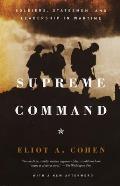 by Eliot A. Cohen
by Eliot A. Cohen
Almost everything you think you know about the civilian-military relationship in a democracy is wrong. Sure, you know that the military needs to be subordinate to the civilian. But what, exactly, does that mean? You think you know that the politicians should declare war, and let the military win it. You think that war is too technical for politicians to understand. You think that political interference lost Vietnam, and military autonomy won the first Gulf War. You think that the US military is non-political. And you think that the best military is non-ideological and professional.
Think again.
Eliot A. Cohen’s Supreme Command makes a persuasive case that an active political leadership, willing to challenge and meddle, is the only way that a civilian political leadership makes sure that the conduct of the war conforms to the political aims that the county went to war for in the first place. Left to their own devices, the military will be tempted to start dictating policy, aside from the mandate of the elected leadership.
Cohen provides four character sketches of successful activist political leadership during wartime: Lincoln 1861-1865, Clemenceau 1917-18, Churchill 1939-45, and Ben-Gurion 1948. Each had a different challenge, and pursued it in his own way. Lincoln needed to find a general not only who could win, but also who had the will to press the war on to its conclusion. Clemenceau needed to balance two eminently competent and intelligent generals with very different ideas on how to prosecute the war in its final stages. Churchill not only needed to keep his coalition together, but also needed to prod his generals into thinking things through all the way. And Ben-Gurion needed to remake a group of local paramilitary forces into a single professional army.
So Lincoln wrote letters and telegrams. Clemenceau spent about 15% of his time at the front; Churchill relentlessly asked probing questions. And Ben-Gurion talked to everyone. All of these activist politicians ended up being thoroughly resented by militaries that thought they knew better. In the cases of Churchill and Lincoln, Cohen understands that he’s swimming against the tide of established orthodoxies, especially as regards Churchill.
Cohen’s claim is that the strong academic backlash against Churchill (whose war memoirs established the immediate post-war narrative) has simple gone too far in focusing on his mistakes rather than on the way he prodded his military chiefs to re-examine their plans. Churchill never overruled his military chiefs, he simply constantly prodded and questioned them, forcing them to defend their assumptions and therefore their conclusions. In fact, this is one of the key functions of a leader and chief executive. As Jack Welch puts it, a leader’s job isn’t to have the answers, it’s to have the questions. Historians who don’t grasp this don’t really understand executive leadership.
Cohen follows up with an survey of Vietnam and the Gulf Wars. Contrary to popular opinion, Cohen understands the restrictions Johnson put on the conduct of the war – preventing offensive ground operations in order to avoid provoking a Chinese reaction. What he doesn’t understand is Johnson’s almost complete faith in the military’s strategy, and why Johnson didn’t question whether that strategy could produce a victory within his constraints. In the end, it was the military and the next President who came up with Vietnamization, which failed when the US withdrew its air support and military subsidies.
His reviews of the Gulf Wars also go against received wisdom: the first Bush administration, learning the wrong lessons from Vietnam, all but ceded complete control over the war to the military chiefs, even allowing them to make such obviously political decisions as when the war was “won,” and to negotiate the cease-fire with Hussein regime. The Iraq War, by contrast, saw heavy management by SecDef Donald Rumsfeld, a man who had already alienated much of the top brass by questioning standing military doctrine. Rumsfeld’s management clearly subordinated war planning to political ends and constraints, to Cohen’s approval.
The Appendix looks at the historical development of the “normal” theory of civilian-military relations, taking aim not only at Huntington’s defense of that theory, but also at his assertion that a non-ideological “professional” military fights best. A moment’s reflection should be enough to convince anyone that the training and practice of a professional military work better when the men doing the fighting believe in their country and their mission.
In the end, Cohen makes a strong case that when a democracy conducts something as serious and potentially destructive as a war, something that requires the ongoing commitment of a people, not merely an organization, the politicans and not the military are best-suited to understanding the symbolism and morale of the people.